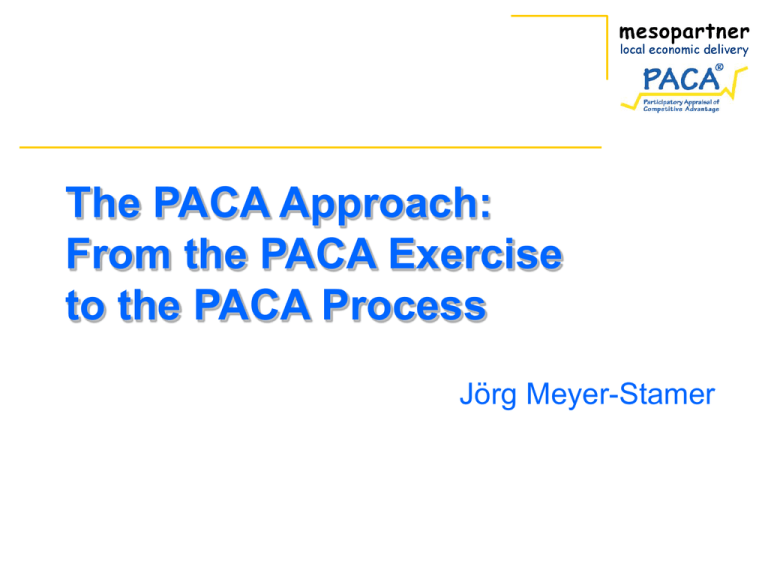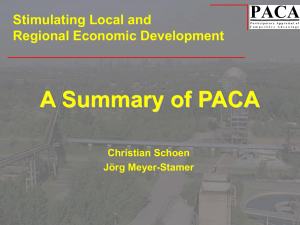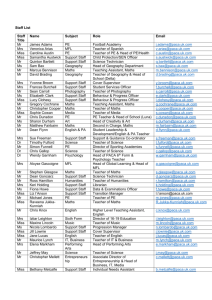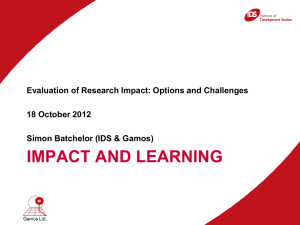From the PACA Exercise to the PACA Process - PACA
advertisement

The PACA Approach: From the PACA Exercise to the PACA Process Jörg Meyer-Stamer Key elements of PACA: The product and its evolution Development and refinement of highly effective miniworkshop formats and other diagnostic tools Documentation and codification of PACA process = facilitate transfer and training Territorial upgrading Territorial change management Scanning of international good practice Execution and evaluation of PACA Projects worldwide Scanning of research / academic literature on territorial development and upgrading The origin of PACA Conducting a rapid, action-oriented appraisal of a local economy Encouraging, empowering and motivating local actors to implement practical, short-term LED activities Challenges in the follow-up to PACA Exercises Limited facilitation skills of local actors – inefficient meetings – little creativity in overcoming obstacles Lower than expected planning skills Quick evaporation of excitement created during PACA Exercise Lessons learnt: practical More external input into supporting the follow-up necessary External facilitators play a crucial role – to overcome fragmentation and miscommunication among local actors – to stimulate creative problem-solving More effort necessary to develop efficient workshop formats for planning and monitoring implementation activities More effort necessary to maintain excitement Lessons learnt: conceptual Overcoming a traditional, planning-oriented, top-downand government-driven approach is a big, challenging learning and change process PACA must put more emphasis on developing tools for change management – i.e. changing the mental models and behaviour of local actors Re-packaging PACA: An approach which provides, for the entire project cycle, innovative, efficient tools – efficient communication tools (e.g. mini-workshops) – participatory planning, monitoring and evaluation tools Evolution of PACA PACA as a process-oriented concept Cluster and value chain development Revolving activities for locational upgrading CommunityBased Economic Development PACA as a diagnostic tool Rapid Appraisal of Local Innovation Systems Efficient Corporate Social Responsibility PACA as a diagnostic tool Emphasis on the initial PACA Exercise – understanding the opportunities and potentials for action to strengthen the local economy – initiating a first round of practical LED activities – quickly visible, albeit modest results to motivate local actors for more LED – initiating a learning process on LED Revolving activities for locational upgrading Basic idea: Series of targeted PACA Exercises – to investigate parts of the local territory – to investigate a sector, a cluster or a value chain in the local economy • to get to more specific LED activities • to give breadth and depth to the initial PACA Exercise Conduct repeated PACA Exercises to monitor, refocus and energise the implementation of earlier PACA proposals Community-based economic development Basic idea: Stimulate activities in poor communities – which do not require individual entrepreneurship, since this is a bottleneck – which follow a clear business logic – which create income for the local community Efficient corporate social responsibility Basic idea: Increase the efficiency of CSR interventions – Observation: CSR interventions are often measured by input, not by outcome – CSR interventions often follow a fuzzy logic, not a business logic – CSR interventions may become more efficient if they follow a clear business-logic PACA is based on business principles and thus particularly attractive and convincing for corporates Cluster and Value Chain development Basic idea: Identify quick win opportunities within a cluster or a value-chain – Observation: Cluster and value chain initiatives often require a long build-up and awarenessbuilding effort before they produce an outcome – PACA principle: quick wins encourage buy-in • move from simple activities with modest results to more complex activities with bigger returns – Specific, highly efficient mini-workshop formats which accept the time-constraints of cluster and value chain actors Rapid Appraisal of Local Innovation Systems Model case of a PACA derivate – created as an assessment tool – evolving into an action-oriented tool • for government technology promotion agencies • for technology transfer organisations Repackaging PACA PACA Project PACA Exercise PACA PACA Tools Tools PACA PACA PACA Tools Tools Tools PACA Tools Very efficient Mini-workshop formats – existing formats – newly developed formats for specific purposes Rapid diagnostic tools – rapid cluster diagnosis workshop – rapid value chain diagnosis workshop






